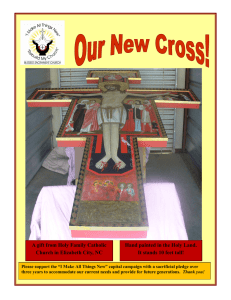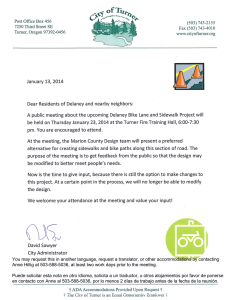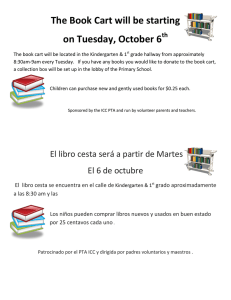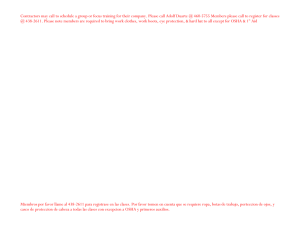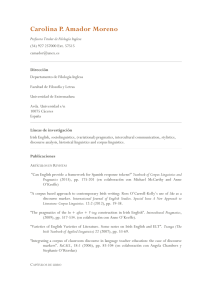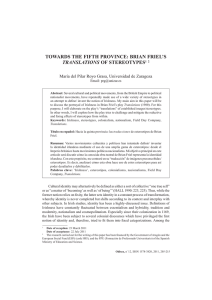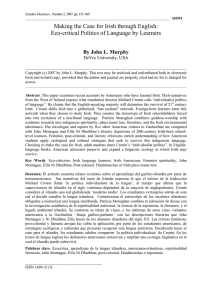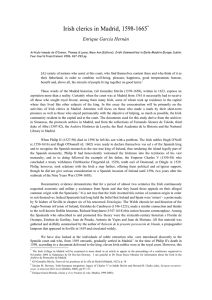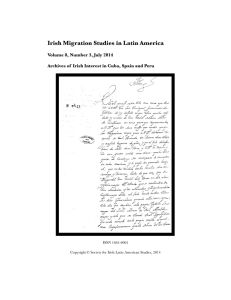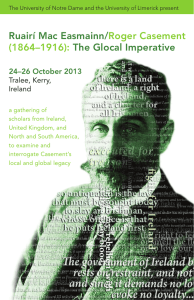IRLANDA Y EL ATLÁNTICO IBÉRICO IRELAND AND THE IBERIAN
Anuncio
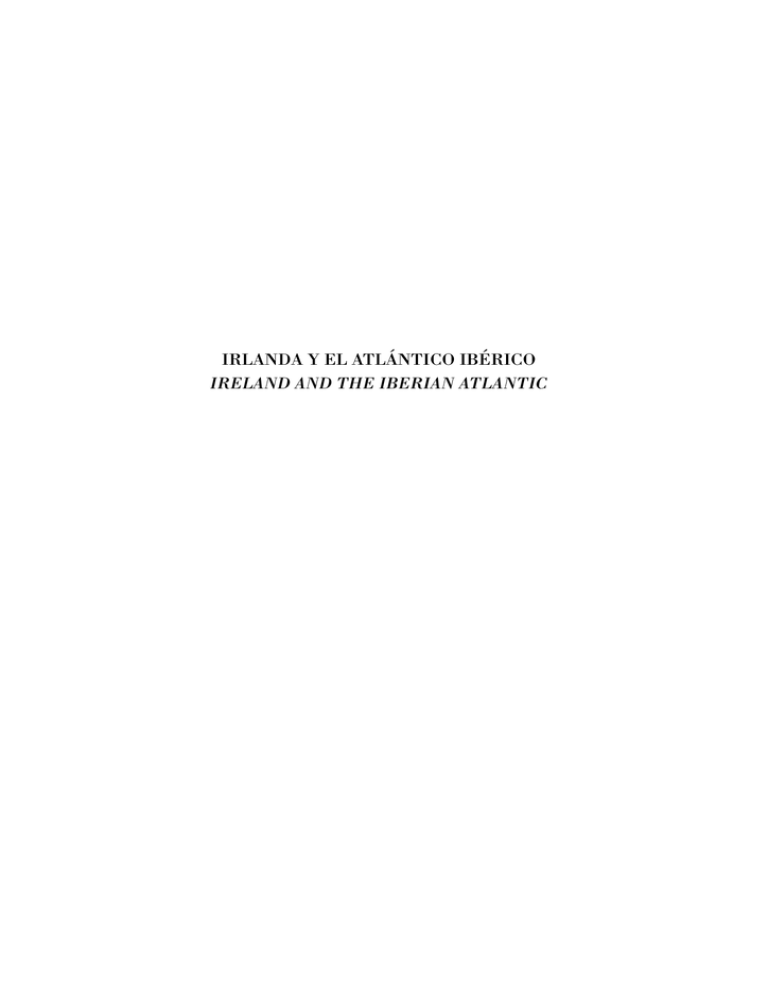
IRLANDA Y EL ATLÁNTICO IBÉRICO IRELAND AND THE IBERIAN ATLANTIC IRLANDA Y EL ATLÁNTICO IBÉRICO Movilidad, participación e intercambio cultural (1580-1823) IRELAND AND THE IBERIAN ATLANTIC Mobility, Involvement and Cross-Cultural Exchange (1580-1823) Igor Pérez Tostado Enrique García Hernán (Editores) ALBATROS EDICIONES © Los autores, 2010 © De esta edición: Albatros Ediciones La Olivereta, 28 46018 Valencia albatros@graficas-soler.com Ilustración de cubierta: Lucas Janszoon Waghenaer, Spieghel der Zeevaerdt, vande navigatie der Wetersche Zee..., Leyden, 1584. ISBN: 978-84-7274-287-1 Depósito legal: V. - 2010 Imprime: Artes Gráficas Soler, S. L. Imprime: www.graficas-soler.com ÍNDICE Presentación de Peter Gunning y Hugo O’Donnell...................................... Introducción de Enrique García Hernán e Igor Pérez Tostado.................... Hacer del dinero riqueza: estrategias de ascenso económico y asentamiento de los comerciantes irlandeses en la Sevilla del siglo XVIII, por Mercedes Gamero Rojas y Manuel F. Fernández Chaves ..................... An Irish merchant in late seventeenth century Málaga, por Jimmy McCrohan ............................................................................................................ ¿Redes de dependencia inter-imperial? Aproximaciones teóricas a la funcionalidad de los agentes de comercio en la expansión de las sociedades mercantiles, por Ana Crespo Solana ............................................... The 18th Century Irish sugar and slave trade at St. Croix, Danish West Indies, por Orla Power .......................................................................... Irish Interloping Trade and Colonial Warfare in the 18th Century, por Thomas M. Truxes......................................................................................... Matériel para la Batalla de Kinsale, por Enrique García Hernán ............... The Financial Cost of Irish Immigration to Castile and Galicia (1601-11), por Ciaran O’Scea ................................................................................. Os Irlandeses perante a Inquisição Portuguesa: réus e reduzidos (séculos XVI-XVIII), por Isabel M. R. Mendes Drumond Braga ........................... La presencia militar irlandesa en el ejército de Extremadura (1640-1668), por Antonio José Rodríguez Hernández ................................................ Irishmen at the Portuguese Court in the Seventeenth Century, por Joana Pinheiro de Almeida Troni ..................................................................... Representing exiled royalists to the Spanish: the Irish courtiers of the exiled Caroline Stuart Court and the Spanish alliance of 1656-1660, por John J. Cronin ........................................................................................ El papel de los irlandeses peninsulares en las reformas de la América española del XVIII, por Óscar Recio Morales ......................................... V VII XIII 1 23 35 51 59 69 95 111 127 155 165 177 VI In Novi Orbis Amplitudine: Irish Franciscan Views of the Americas in the Seventeenth Century, 1610-1683, por Benjamin Hazard ...................... Few, uncooperative, and endangered: the activity of the Irish Catholic priests in the West Indies of the seventeenth century, 1638-1668, por Matteo Binasco ...................................................................................... Pedro Alonso de O’Crouley y O’Donnell (1740-1817) y el descubrimiento ilustrado de México, por Salvador Bernabéu Albert ............................. Whether Habsburgs or Bourbons: Some Reflections on the alignments of Nobles of Irish Origin in the war of the Spanish Succession, 17131723, por Declan M. Downey ................................................................ The Lisbon Irish in the 18th Century, por Pedro O’Neill Teixeira................. Irlandesas y poder político en la España del siglo XVIII: el papel de la marquesa de Salas y de la condesa de Lismore durante la Guerra de Sucesión austriaca, por Diego Téllez Alarcia ................................................. Powerful Presences: Ireland in Spanish Poetry, Spain in Irish Poetry, por Beatriz Villacañas .................................................................................. Conectores del mundo atlántico: los irlandeses en la red comercial internacional de los Grillo y Lomelín, por Manuel Herrero Sánchez e Igor Pérez Tostado ......................................................................................... Los estudios irlandeses y el Atlántico ibérico (siglos XVI-XVIII): una selección bibliográfica, por Óscar Recio Morales ........................................ Índice analítico ............................................................................................. Índice 193 211 225 243 253 267 287 307 323 337 PRESENTACIÓN Excmo. Sr. Peter Gunning Embajador de la República de Irlanda en Madrid R ECTOR, Coordinador del CSIC, Don Hugo, distinguished participants. This is a large and ambitious undertaking that begins here today and will continue through to 1 November. I would simply like, on behalf of the Embassy and the Irish Government, to wish the conference on “Ireland and the Iberian Atlantic” every success. We are looking forward to hearing many of the contributions and to meeting as many of you as possible during the proceedings. Collectively, all of you – the organisers, coordinators, hosts and participants – represent a very significant asset in the context of Spanish-Irish relations. Your work, your insights, your publications, afford a deep background to the relations between Spain and Ireland today and a sense of continuity and connection running through those relations over the centuries. We very much appreciate what you bring to the task and are very pleased to be among the Conference’s sponsors. That sense of continuity and of building on what has gone before was reinforced for me when I saw the record of the First International Symposium on Spanish Irish Relations held in Salamanca in 2004. It is a beautifully produced work – congratulations to Four Courts Press – with a wonderful portrait of Richard Wall on the cover and with a fascinating range of material from medieval times to the 1950s. I cannot resist, as the current Irish Ambassador to Spain, quoting from Michael Kennedy’s account of Leopold Kerney’s St. Patrick’s Day reception in 1936 “he organised a mass and together with his wife hosted a reception for 70 people or so, practically all governesses or teachers, at the Irish Legation. This was the first occasion that many members of the Irish colony had a chance to meet each other…”. And later, more mundanely, “I was able to get off the May accounts with some efforts and with the valuable assistance of Mrs. Kerney”. Congratulations to Dr. Declan Downey and Julio MacLennan, as editors, and may I take this opportunity to add further congratulations to Declan for the bestowal on him in May this year of a Knighthood of the Order of Isabel la Católica. VII VIII Peter Gunning I am sure that this second international symposium will produce similarly rich and diverse proceedings and provide another link in the series. The Conference also represents the second meeting within the Spanish Ministry for Education and Science project on Irish Emigre Groups in Spain. The Director, Enrique García Hernán, has been energetic and tireless in his dedication to this project. He has mined rich and diverse sources in his work on the Irish military presence in Spanish society in the 16th and 17th centuries, as well as the clerical dimension. What is beginning here today in the discussions of economic and commercial links and their broadening out across the Atlantic, is a new and promising dimension. Spain is rich in archival material – I hardly need to underline that here in Seville with its Archivo General de Indias – and not all of it, perhaps surprisingly, yet fully explored or cross-referenced. I would just like to take this opportunity to mention the recent discovery by Enrique and colleagues of a very large archive – some 25,000 documents – on the Misión de Irlanda spread between the Royal Palace, Simancas, and the Diocesis of Madrid. I know that some initial contacts have taken place both in Maynooth and in the National Library regarding this, and we hope that arrangements can be made to catalogue and exploit this material. It will no doubt be another fertile field, adding greatly to our knowledge of the Irish clergy trained in Spain. I should like to add a word of thanks to the Universidad Pablo de Olavide and to Igor Pérez Tostado for all the facilities offered to the Conference. Seville is a wonderfully appropriate venue, given on the one hand its Irish connections through the Irish College and the Blanco-Whites and Wisemans who contributed to the varieties of Irishness here; and on the other hand, for its opening to the transatlantic world when the fleet of the Indies was unloading here on the keys of the Guadalquivir. It is also an appropriate time for us in Ireland, and in Spain, to be looking across the Atlantic in the light of the importance of the electoral outcome there next Tuesday. Both countries, with their frontage on the Atlantic, have felt at times the tension between American and European orientations – the Boston versus Berlin argument in Ireland. I wish you well over the next few days in bringing some historical illumination to this contemporary conundrum.
